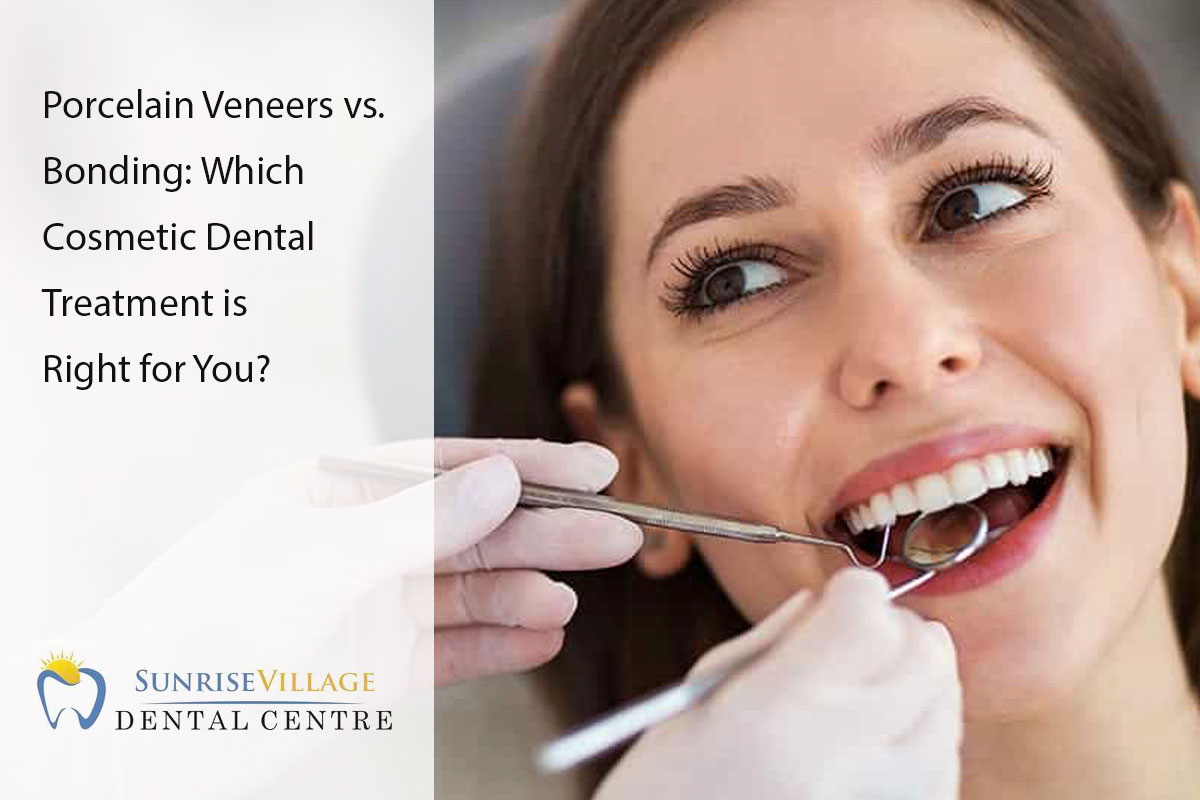
Want to improve your smile and confidence? Cosmetic dentistry has options like porcelain veneers and dental bonding. Both have unique benefits. Knowing the differences can help you choose the best one for your needs.
What are Porcelain Veneers?
Porcelain veneers are thin shells crafted from medical-grade ceramic that are custom-made to fit over the front surface of your teeth. These veneers are meticulously designed to match the shape, size, and colour of your natural teeth, providing a seamless and natural-looking appearance.
Pros and Cons of Porcelain Veneers
Pros:
- Natural appearance that closely resembles real teeth
- Durable and long-lasting solution for various dental issues
- Stain-resistant and easy to maintain with regular oral hygiene practices
Cons:
- Higher initial cost compared to other cosmetic treatments
- Irreversible process as a thin layer of enamel needs to be removed
- May require multiple dental visits for assessment, preparation, and placement
What is Dental Bonding?
Dental bonding, also known as composite bonding, is a cosmetic procedure that involves applying a tooth-coloured resin material to your teeth to repair minor imperfections such as chips, cracks, gaps, and discolouration. This versatile treatment can also be used to reshape and contour teeth, improve the appearance of uneven edges, and fill small cavities.
Pros and Cons of Dental Bonding
Pros:
- Quick and minimally invasive procedure
- Affordable option for improving the appearance of your smile
- Can be used to address various minor dental imperfections
Cons:
- Less durable and stain-resistant compared to porcelain veneers
- May require periodic maintenance and touch-ups for longevity
- Limited in its ability to address more complex dental issues
Factors to Consider When Choosing Between Veneers and Bonding
When deciding between porcelain veneers and dental bonding, consider these key factors to choose the best treatment for your dental needs and lifestyle:
- Extent of Dental Imperfections:
- Porcelain Veneers: Ideal for severe discolouration, large gaps, and extensive damage.
- Dental Bonding: Better suited for minor flaws and cosmetic enhancements.
- Durability and Longevity:
- Porcelain Veneers: Known for exceptional durability and stain resistance; a long-lasting solution.
- Dental Bonding: May require more frequent touch-ups and maintenance over time.
- Cost:
- Porcelain Veneers: Higher upfront cost but superior aesthetics and durability.
- Dental Bonding: More affordable with noticeable improvements, but may need more maintenance.
- Time Commitment:
- Porcelain Veneers: Requires multiple dental visits for assessment, preparation, and placement.
- Dental Bonding: Often completed in a single appointment, making it a quicker option.
Choosing the Right Treatment for Your Specific Dental Needs
Ultimately, choosing between porcelain veneers and dental bonding depends on your specific dental concerns, preferences, and budget. Porcelain veneers are ideal for significant cosmetic issues and offer long-lasting, natural-looking results, while dental bonding is a quicker, more budget-friendly solution for minor imperfections. A consultation with a qualified cosmetic dentist will help you determine the best option based on your oral health and desired outcomes, ensuring a personalized treatment plan for a brighter, more confident smile.
Conclusion
Porcelain veneers and dental bonding stand out as popular and effective solutions for enhancing the appearance of your smile. Whether you opt for the durability and natural aesthetics of porcelain veneers or the convenience and affordability of dental bonding, achieving a radiant and flawless smile is within reach with the right cosmetic dental treatment tailored to your needs. Book an appointment with Sunrise Village Dental today by calling (604) 253-2433.
